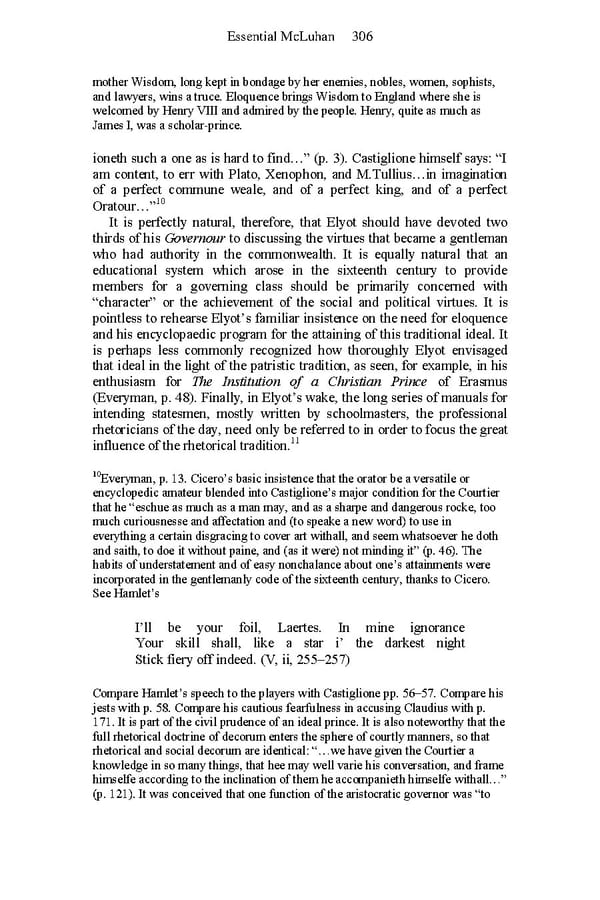Essential McLuhan 306 mother Wisdom, long kept in bondage by her enemies, nobles, women, sophists, and lawyers, wins a truce. Eloquence brings Wisdom to England where she is welcomed by Henry VIII and admired by the people. Henry, quite as much as James I, was a scholar-prince. ioneth such a one as is hard to find…” (p. 3). Castiglione himself says: “I am content, to err with Plato, Xenophon, and M.Tullius…in imagination of a perfect commune weale, and of a perfect king, and of a perfect 10 Oratour…” It is perfectly natural, therefore, that Elyot should have devoted two thirds of his Governour to discussing the virtues that became a gentleman who had authority in the commonwealth. It is equally natural that an educational system which arose in the sixteenth century to provide members for a governing class should be primarily concerned with “character” or the achievement of the social and political virtues. It is pointless to rehearse Elyot’s familiar insistence on the need for eloquence and his encyclopaedic program for the attaining of this traditional ideal. It is perhaps less commonly recognized how thoroughly Elyot envisaged that ideal in the light of the patristic tradition, as seen, for example, in his enthusiasm for The Institution of a Christian Prince of Erasmus (Everyman, p. 48). Finally, in Elyot’s wake, the long series of manuals for intending statesmen, mostly written by schoolmasters, the professional rhetoricians of the day, need only be referred to in order to focus the great influence of the rhetorical tradition.11 10Everyman, p. 13. Cicero’s basic insistence that the orator be a versatile or encyclopedic amateur blended into Castiglione’s major condition for the Courtier that he “eschue as much as a man may, and as a sharpe and dangerous rocke, too much curiousnesse and affectation and (to speake a new word) to use in everything a certain disgracing to cover art withall, and seem whatsoever he doth and saith, to doe it without paine, and (as it were) not minding it” (p. 46). The habits of understatement and of easy nonchalance about one’s attainments were incorporated in the gentlemanly code of the sixteenth century, thanks to Cicero. See Hamlet’s I’ll be your foil, Laertes. In mine ignorance Your skill shall, like a star i’ the darkest night Stick fiery off indeed. (V, ii, 255–257) Compare Hamlet’s speech to the players with Castiglione pp. 56–57. Compare his jests with p. 58. Compare his cautious fearfulness in accusing Claudius with p. 171. It is part of the civil prudence of an ideal prince. It is also noteworthy that the full rhetorical doctrine of decorum enters the sphere of courtly manners, so that rhetorical and social decorum are identical: “…we have given the Courtier a knowledge in so many things, that hee may well varie his conversation, and frame himselfe according to the inclination of them he accompanieth himselfe withall…” (p. 121). It was conceived that one function of the aristocratic governor was “to
 Essential McLuhan Page 312 Page 314
Essential McLuhan Page 312 Page 314